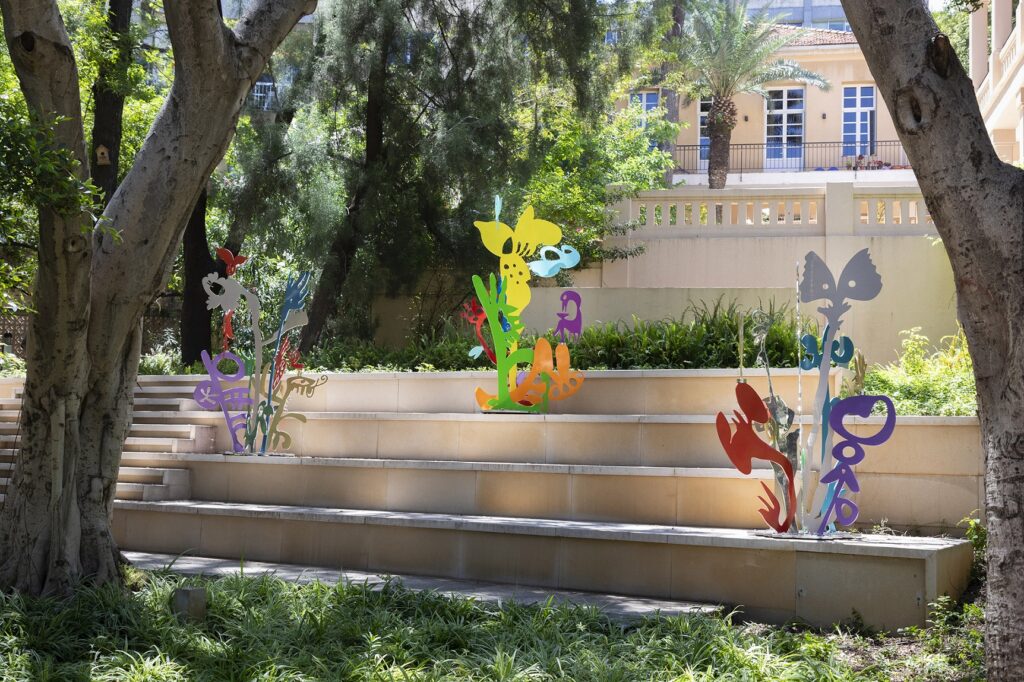“Nadim Mkari” – T-Race’s PCB-137
Ole Moystad, Architect and Doctor of Semiotics
Published in T-Race’s PCB-137, Nadim Karam & Atelier Hapsitus, 1995
The Mkari is a traditional Lebanese figure- the peddler who wanders off from his village. He seeks the unknown, he embraces the different, and at times he returns to tell stories and sell pieces from elsewhere. I met him one October afternoon in an olive grove at the outskirts of a tiny village on the western slopes of Mouny Lebanon. Deep down below us the Beirut peninsula was floating in misty golden light. Beyond it, there was only sun.
The Mkari was rebuilding the ruins of his mother’s childhood home. His life needed a chronotope, he told me. Traveling can be a vertiginous experience. But wisdom is narrative and cannot prosper without being continuously told and retold. The cogitating subject cannot think without having someone to converse with. He cannot trade in isolation, he told me. And who can tell stories from elsewhere if your listeners know that you haven’t been there? People would inquire if your accounts were true or not, and suspicion kills.
Insight, I objected, cannot be hidden and then traded with- or used to capture and hold positions. Knowledge cannot be harmed by other knowledge. Only a strategic position can be harmed by an insight- if it is unveiled as being exactly that, and not insight. Knowledge which is not open to inquiry should be looked upon with suspicion, whereas suspicion towards inquiry is only dumb.
He looked at me for a while, then asked me where I came from. I told him, and he said he had heard an Italian renaissance cartographer call that part of the world “mezzanotte”. He sat down to clean the earth from his shoes. Before I could ask him how he could possibly have met an Italian renaissance cartographer, he went on to tell me he had bought his shoes in Provence- from a Dutch painter .
“Decipitur…”, I started, without asking if he had seen the painter’s right ear. He stopped me with a wink of his hand. He looked up at me. “No, no,” he said, “the world does not want to be deceived. The world wants to be dazzled, to hear wonderful things. That is why I tell my stories, and that is how we keep our thoughts alive. When you traveled to the Levant, you went to where your sun rose. So did I when I went in diaspora. It would be very unwise to take advantage of this need in order to deceive. A Mkari who did that would soon be out of business.”
Beirut down-town took me by the throat. The streets ran full of urban fluids and waste. Sewers were jammed. Excrements were coming out of the broken manhole covers. The ground had a surface of hard-trodden oil and dust which rounded all edges; like wrinkles in the skin of some pre-historic beast. Only here and there it is ripped open. It emits ancient fumes of war. The veins of the beast lie bare and prey to scavengers of all kinds. Its body rests in a state of painful sleep, somewhere between life and death. It hardly breathes. Only its heart is pounding to the sound of one hundred thousand generators, and all over it there are peddlers crawling with three-wheeled barrows. That is where I met my friend, the Mkari, for the second time.
The cruel charm of the ways and doings, the inventivity of survival, the cynicism of necessity; it all used to make me smile when I heard stories about them. How come it does not have the same effect to see it happen all around me- in situ?
There is something intentional about laughing and crying, the Mkari smiled, but when you are off limits, there is always a ground of fear in you. The tricks and trades of life become facts that are imposed upon you. As an alien, you can only keep quiet and pay attention. Only later, when you are elsewhere, you can tell stories about it.
During the war, snipers and militias made down-town off limits to everyone except the mongrels. We who used to cross the demarcation line every day, learnt to read the play of shadows in empty buildings, ruins and militia-men’s faces like you would read shadows on the paper screens of Japanese houses or trace the Golem in old Prague. Every crossing was like a loophole in time. The inside of no-man’s land was like a flow of elementary particles whose forms anteceded and succeeded all other forms in a continuous morphogenesis. When you entered the green-line area, you deposited your life at the checkpoint and went in as dust, never knowing in what form you would be ejected.
Eventually, when I returned from my ten years with the rising sun, he went on, there was little but dust left of down-town, rubble and memories. Of the mongrels that had fed on the dead, there were only a few old and lazy ones left. The rest were extinguished, and the devastated city was dynamited and dumped in the sea.
Memories became traces here. In this temporal loophole, the lapse of time brought Roman temples and Phoenician ramparts into re-presence. The devastation of down-town brought 4000 years of not even memories back into becoming. To this interface of extended presence people carry their plastic chairs every Sunday. They arrange their chairs and sit down where the sidewalks and cafés are stored in their common memory, rendering the pattern of real-time cyberspace.
This must be the Archaic Procession, I thought. “The chairs must be chronotopes in these people’s lives,” I said, looking at dust on my shoes. When I looked up, the Mkari was gone.
